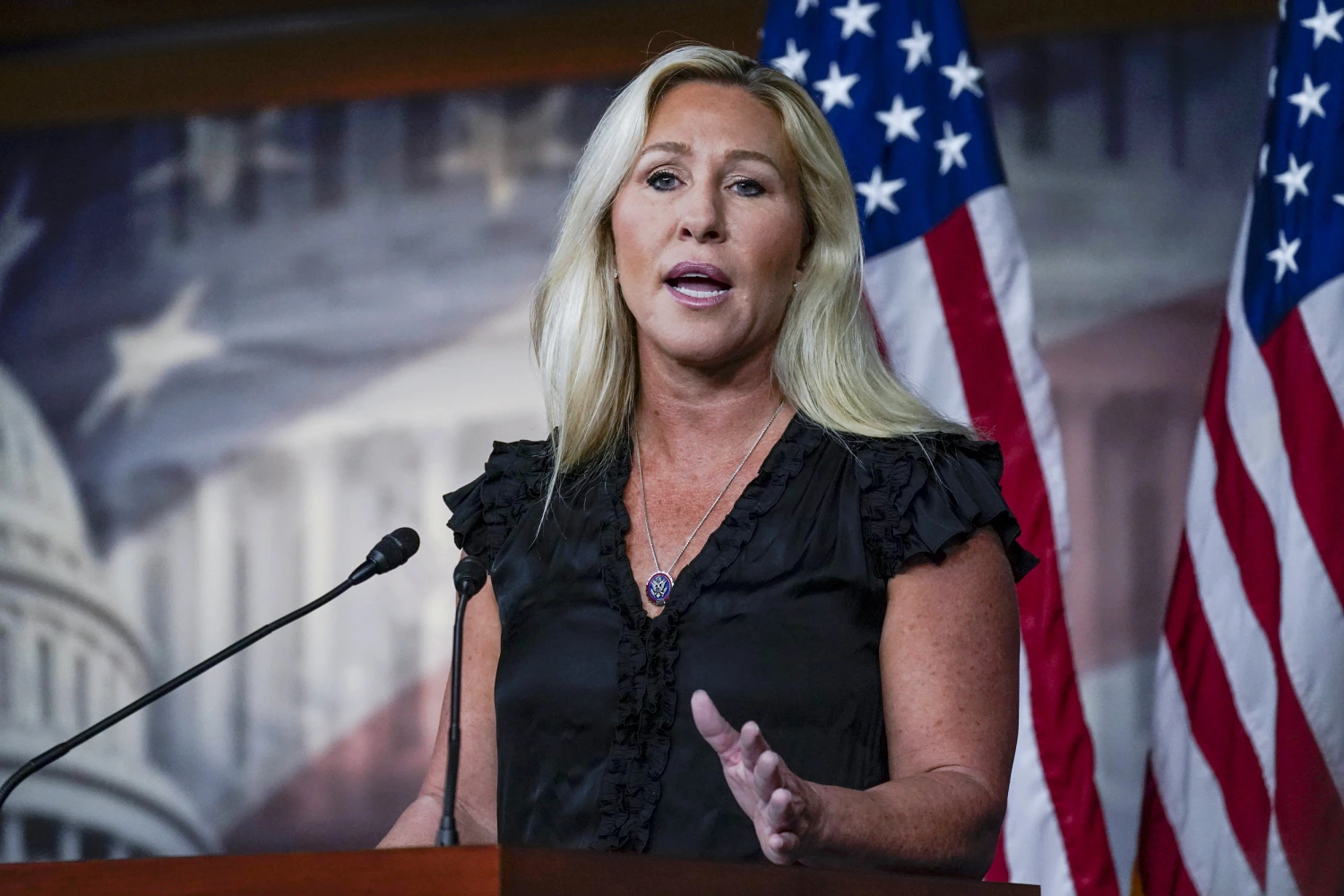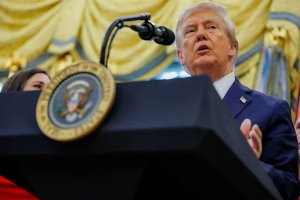Republican Representative Marjorie Taylor Greene has publicly denied rumors that she plans to run for president in 2028, asserting that reports suggesting such a bid are completely false. Greene, who represents Georgia in the U.S. House of Representatives, has recently made headlines for her decision not to seek reelection and for her increasingly critical stance toward the Republican Party, including a high-profile disagreement with former President Donald Trump. Her denial of the 2028 speculation highlights a growing narrative of division within the GOP, as well as the challenges faced by high-profile conservative figures navigating a shifting political landscape.
In a detailed post on X, Greene directly addressed the claims, stating, “I’m not running for President and never said I wanted to, and I have only laughed about it when anyone mentioned it.” Her comments were aimed at quelling speculation that had arisen following reports from major outlets suggesting that Greene might be considering a presidential bid in the next election cycle. These reports had alleged that she could leverage such a campaign to gain influence within the Republican Party, even if she did not intend to secure the nomination.
Greene’s decision to leave Congress in January has been the subject of intense media coverage. While she framed her resignation as a personal choice, the timing of her departure coincides with a well-documented fallout with Trump, who had been one of her most prominent allies in the party. For weeks, Greene openly criticized Trump for what she characterized as insufficient focus on domestic issues, accusing him of prioritizing foreign policy initiatives over pressing American concerns. In addition, she was among the most vocal Republican figures challenging the handling of the Jeffrey Epstein case files, a highly controversial topic that has fueled debate among conservatives and Democrats alike.
Trump, in response, labeled Greene a “traitor” and expressed support for a GOP primary challenger to her House seat. The former president’s comments underscore the personal and political tensions between the two figures, highlighting how internal conflicts within the party can have significant ramifications for candidates and incumbents alike. Greene’s decision to resign, therefore, comes not just as a personal choice but also as a strategic response to the changing dynamics within the Republican Party.
In recent months, Greene has further distanced herself from the broader GOP, openly criticizing the party’s handling of several high-profile issues, including government shutdowns and legislative negotiations. Analysts suggest that her critiques reflect a broader ideological struggle within the party, between traditional establishment figures and outspoken, high-profile members who often challenge party orthodoxy. Greene’s public statements, in particular, reveal a willingness to confront party leaders and to prioritize her own assessment of issues over political loyalty—a move that has made her both influential and controversial.
The speculation about a potential presidential run in 2028 began circulating after a TIME report suggested that Greene had privately considered entering the race. According to the article, House Republicans familiar with Greene’s thinking believed that such a campaign could siphon votes from the eventual GOP nominee and potentially allow her to leverage political capital for a future role within a Republican administration. Greene’s response was unequivocal: she called the report “a complete lie” and criticized the lack of attribution in the article, noting that no sources had been publicly identified.
In addition to denying the presidential speculation, Greene elaborated on the practical reasons why she would never pursue such a campaign. She described the immense personal and professional sacrifices required to run for president, highlighting the grueling demands of travel, fundraising, public appearances, and the constant scrutiny of the media. She emphasized that a presidential bid would leave candidates “totally blocked from truly fixing anything” and argued that the systemic challenges in American politics would limit the ability of any individual to enact meaningful change, regardless of electoral success.
Trump’s critics and supporters alike have noted that Greene’s statements reflect a growing tension within the Republican Party, as ambitious politicians weigh personal principles against political expediency. By publicly rejecting the idea of a presidential run, Greene not only clarifies her own ambitions but also signals her desire to focus on other priorities, whether personal or political, outside of a national campaign. Her decision may also reflect lessons learned from observing the intense pressures faced by other high-profile figures within the party, including Trump himself.
Further complicating the narrative are Trump’s previous claims regarding Greene’s political ambitions. Earlier this month, he suggested that her criticisms of him were rooted in his discouragement of her potential bids for Senate or governor in Georgia. Greene directly refuted this assertion, telling CNN anchor Dana Bash that she never discussed such possibilities with Trump and that her decisions were independently made. Her clarification underscores her desire to assert autonomy over her political career, particularly in the context of a party environment where high-profile endorsements and alliances often shape career trajectories.
Greene’s statements also reflect a broader debate about the role of women in American politics. Running for president, she noted, requires significant personal sacrifice and exposes candidates to unprecedented public scrutiny. Greene framed her decision in part around a critique of the structural barriers and pressures that women in politics face, particularly in balancing public service with personal and family commitments. Her discussion of these challenges resonates with ongoing conversations about gender and leadership within the political sphere.
While Greene has rejected the idea of a presidential run, her resignation and ongoing critiques of the GOP could have lasting political consequences. Analysts suggest that her departure from Congress may create a power vacuum in her district, potentially prompting a contested primary or opening the door for more moderate Republican figures to gain influence. Additionally, her outspoken criticism of both Trump and the party may inspire other conservatives who are dissatisfied with party leadership to consider alternative approaches or independent strategies.
The fallout from Greene’s resignation also intersects with broader discussions about accountability and loyalty within the Republican Party. Her willingness to openly critique Trump, despite their prior alliance, illustrates a tension between ideological alignment and personal convictions. In a party that often emphasizes loyalty to high-profile figures, Greene’s actions highlight the risks and opportunities inherent in speaking out, particularly when confronting controversial decisions or handling sensitive issues like the Epstein files.
Greene’s rejection of a 2028 presidential bid also reflects a calculated approach to managing her public image. By publicly denying speculation, she limits media narratives that might cast her as ambitious for personal gain rather than principle. This approach allows her to focus on other priorities, whether political, personal, or professional, without being distracted by the constant scrutiny that comes with speculation about national campaigns.
Throughout her career, Greene has built a reputation as a polarizing figure, often drawing intense attention for her outspoken views, social media activity, and confrontations with party leadership. While some conservatives view her as a fearless advocate for their priorities, others see her actions as disruptive to party unity. Her recent statements, however, indicate a deliberate strategy to assert control over her political trajectory, emphasizing personal choice and ideological consistency over speculative ambition.
As Greene prepares to leave Congress in January, the implications of her departure are likely to be felt both within Georgia and nationally. Her district may see a highly contested primary, and her critiques of Trump and the GOP could influence debates around party priorities and leadership. At the same time, her decision not to pursue the presidency signals a conscious rejection of the high-profile, high-stakes world of national campaigns in favor of a more controlled, principled approach to political engagement.
In conclusion, Marjorie Taylor Greene’s denial of a 2028 presidential run underscores her independence and willingness to speak candidly about the demands of political life. Her resignation, critiques of party leadership, and public statements reflect both a personal and strategic approach to navigating a complex political landscape. By rejecting speculation and emphasizing her autonomy, Greene positions herself as a figure focused on principle rather than personal ambition, even as the Republican Party faces ongoing internal debates about leadership, loyalty, and the direction of the conservative movement.
Greene’s story is a reminder that political careers are shaped not only by ambition but also by strategy, principle, and personal choice. While speculation about future campaigns often dominates media narratives, Greene’s clear rejection of such possibilities allows her to focus on her own priorities and maintain control over her political and personal life, even in the face of intense public scrutiny. As she exits Congress, her legacy and influence will continue to spark discussion and debate, illustrating the evolving dynamics of contemporary American politics and the challenges faced by high-profile political figures in maintaining both personal integrity and public influence.

Emily Johnson is a critically acclaimed essayist and novelist known for her thought-provoking works centered on feminism, women’s rights, and modern relationships. Born and raised in Portland, Oregon, Emily grew up with a deep love of books, often spending her afternoons at her local library. She went on to study literature and gender studies at UCLA, where she became deeply involved in activism and began publishing essays in campus journals. Her debut essay collection, Voices Unbound, struck a chord with readers nationwide for its fearless exploration of gender dynamics, identity, and the challenges faced by women in contemporary society. Emily later transitioned into fiction, writing novels that balance compelling storytelling with social commentary. Her protagonists are often strong, multidimensional women navigating love, ambition, and the struggles of everyday life, making her a favorite among readers who crave authentic, relatable narratives. Critics praise her ability to merge personal intimacy with universal themes. Off the page, Emily is an advocate for women in publishing, leading workshops that encourage young female writers to embrace their voices. She lives in Seattle with her partner and two rescue cats, where she continues to write, teach, and inspire a new generation of storytellers.









